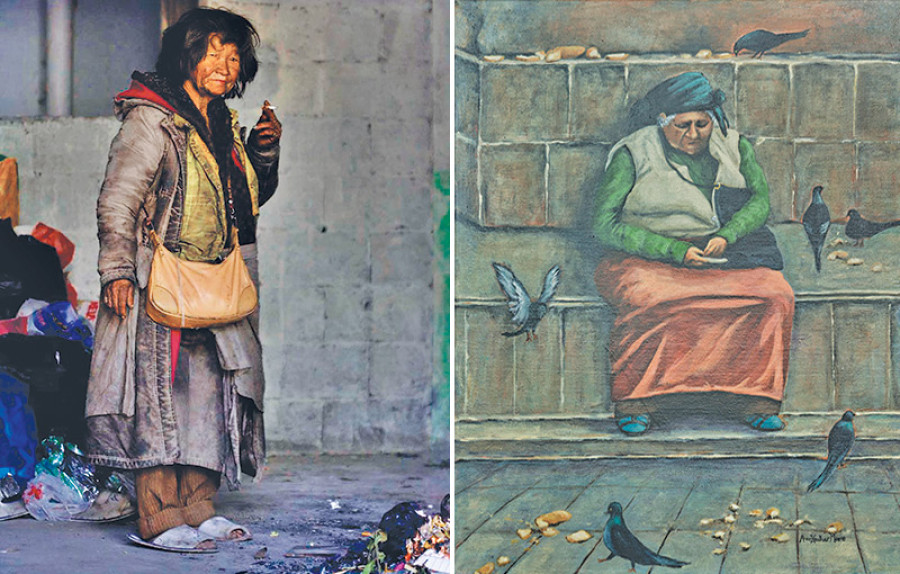Entertainment
Kanchhi
It has been used since many years, this word. It has been passed down to us by our ancestors to be used for maidens who are the youngest of them all. “Kanchhi” also signifies a bond which suggests that the girl being addressed is a known one, a dear one.
Medha Malla
It has been used since many years, this word. It has been passed down to us by our ancestors to be used for maidens who are the youngest of them all. “Kanchhi” also signifies a bond which suggests that the girl being addressed is a known one, a dear one.
I have had a Kanchhi in my life. A Kanchhi who didn’t quite fit the traditional definition, but is a part of my childhood memories.
During my childhood, I used to stay at Mathighar, my uncle’s home. And every time I refused to eat, my grandma, who I called Ama, would threaten me, “chhito kha natra kanchhi ayera laijanche!” Eat quickly or Kanchhi will take you away.
The word ‘Kanchhi’ would then immediately trigger fear in my heart for it would paint the image of a shabby woman on a hillock surrounded by garbage. The thought of her taking me away from my family if I didn’t finish my food scared me.
Kanchhi wasn’t all that scary. She lived in the same neighbourhood and talked normally as far as I can remember. While she was tagged “bahulai” (lunatic),the locals treated her nicely. People were okay with her being around, some even liked her. I once heard over a tea-party at Ama’s that it was the hatred of her sons and daughter-in-laws that drove her crazy and caused her to wander around homelessly.
I used to see her every day on my way to school. She used to be just there, asking for a cup of tea or a slice of bread. Her voice was never harsh and her eyes were always gentle and inviting. Yet, I never went near her, for the fear that she would take me away had been deeply-rooted in me. I never took too much of interest in her. The folk stories that I had heard made me perceive her as a witch who prowled the streets at night.
When my family moved out from Mathighar, I started seeing her less frequently. And from distance, she seemed less scary. She was no longer a monster. She became just Kanchhi.
My Ama would give her the leftovers and she would be happy. She never asked for more than what she got. She was easy to please and she was always content. It always seemed like she felt at home in the neighbourhood. In return, she also made Mathighar’s surrounding more homely.
Kanchhi was always only in the background, yet she provided some sense of ordinariness to the chaotic, fast-growing city that now exists without her. The road would feel familiar at the sight of Kanchhi seated on the sidewalk with her sack of belongings. We were strangers who never talked but were capable of feeling the presence of the other person. And this odd bond was enough to make me breathe a sigh of relief when I walked the road.
Few months ago at one of Ama’s tea parties, I found that she had disappeared. All we knew was now Kanchhi was somewhere near Damauli. Nobody knew where exactly. It was also made clear that she had run away after the locals had decided to put her in an asylum under the government’s care.
The thought of spending her last days somewhere unknown might have triggered the feeling of homesickness in her. She probably just wanted to be free. The world outside probably made a huge part of her memories to let go of it now.
While the ladie were quick to shift their attention to the government’s negligence in looking after people in need, I had already zoned out. Kanchhi had disappeared and for some unknown reason, I felt sad for her. I missed her. I worried for her.
People went back to their lives. Everyone soon adjusted to the fact that Kanchhi was no longer around. She was just an extension of the neighbourhood, just a crazy lady with her baggage. The older generation would soon push her into the back of their heads, and the newer generation would only know of her through stories and threats, “chhito kha natra police ayera laijancha.”
It seems so easy to forget somebody who is not in plain sight: Out of sight, out of mind. It is just how we humans are. We live on. We move on.
But I don’t want Kanchhi to be forgotten. Maybe she is happy where she is now. Maybe she is not. But I really hope she comes back.
Malla is an A-levels student at Rato Bangala School




 9.7°C Kathmandu
9.7°C Kathmandu










